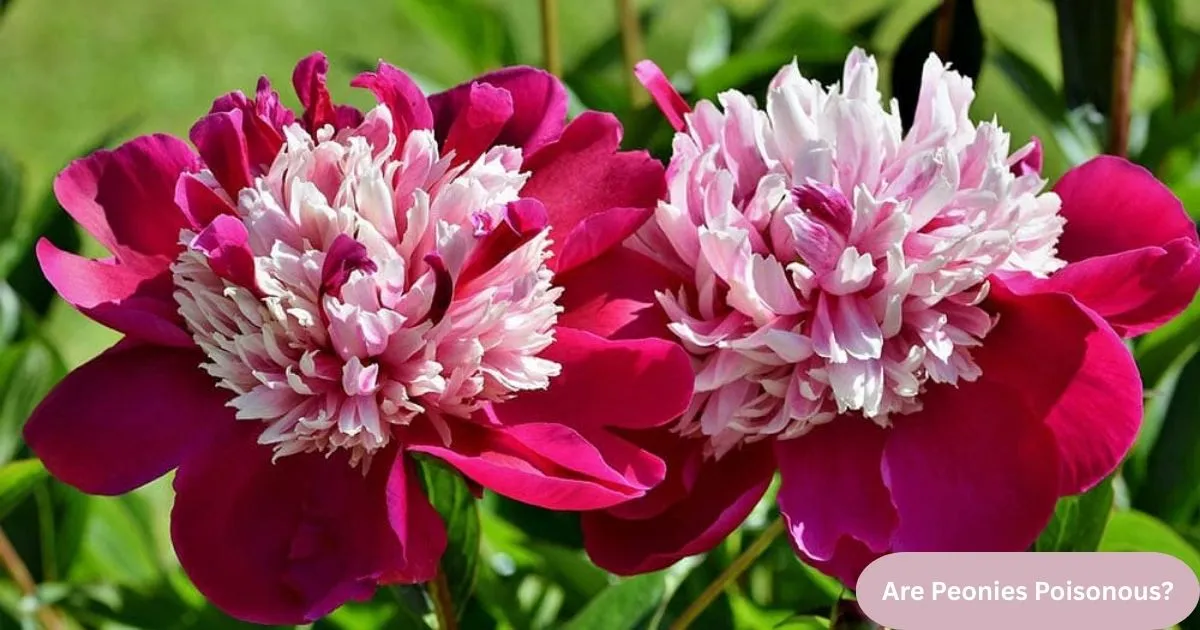Peonies are stunning flowers known for their large, colorful blooms and pleasant fragrance. While they add beauty to gardens and floral arrangements, many people wonder if they pose any health risks. It’s important to know whether these popular flowers are poisonous to humans or pets before incorporating them into your space.
In this article, we will explore the potential toxicity of peonies, focusing on their effects on pets, children, and adults. Understanding the risks will help you make informed decisions about growing these beautiful flowers while ensuring the safety of your loved ones and animals.
Understanding Peonies
Peonies are flowering plants that belong to the genus Paeonia. They are native to Europe, Asia, and North America and are known for their large, showy flowers. The flowers come in a variety of colors, including white, pink, red, and purple. Peonies are often used in floral arrangements and landscaping due to their stunning appearance and long-lasting blooms.
Despite their beauty, peonies contain compounds that may be harmful in certain conditions. It’s important to understand what parts of the plant could pose a risk and to whom. While these flowers are not highly toxic, caution is still advised, especially around animals and small children.
Are Peonies Poisonous to Pets?
Peonies are generally considered non-toxic to most pets, including dogs and cats. However, certain animals may experience mild symptoms if they ingest parts of the plant. The main issue with peonies is that they contain a chemical called paeonol, which can cause mild stomach upset or irritation if consumed in large amounts.
Although the toxicity of peonies is low, it’s always a good idea to prevent pets from eating the plants. Ingesting even small amounts of the plant’s leaves, stems, or flowers may lead to gastrointestinal discomfort, including vomiting or diarrhea. Always keep a close eye on pets when they are near peonies to prevent accidental ingestion.
Are Peonies Toxic to Humans?
Peonies are not considered toxic to humans, but it’s still essential to be cautious. The plant’s compounds, particularly paeonol, may cause mild skin irritation in some individuals. If you come into direct contact with peonies, it’s a good idea to wash your hands thoroughly afterward, especially if you have sensitive skin.
While it’s unlikely to suffer severe effects from handling peonies, there is always a possibility of an allergic reaction. If you experience redness, itching, or swelling after touching the plant, it’s best to avoid further contact and consult a doctor if necessary. Overall, peonies pose minimal risk to human health, but it’s still wise to exercise caution, particularly if you have allergies.
Peony Flowers and Edibility
Peony flowers are not edible and should not be consumed. While some plants have edible flowers, peonies are not one of them. Eating the flowers, stems, or leaves could lead to mild toxicity or digestive issues. Although they are not deadly, ingesting large quantities of any part of the peony plant is not recommended.
The mild toxicity of peonies is mainly due to their chemical compounds, which are not harmful in small amounts but can cause discomfort in larger doses. For those curious about edible flowers, it’s better to stick with safe options like nasturtiums or pansies. Always research the safety of a plant before consuming any part of it.
Symptoms of Peony Poisoning in Pets
If a pet happens to consume a part of a peony plant, the symptoms of poisoning are typically mild. The most common signs are gastrointestinal upset, including vomiting and diarrhea. In rare cases, pets might experience drooling or a lack of appetite. These symptoms usually subside within a day or two without the need for medical intervention.
If you notice any unusual behavior in your pet after they have eaten peony, it’s always a good idea to contact a veterinarian. They can offer advice on whether your pet needs treatment. While peony poisoning is rarely serious, it’s better to be safe and have your pet examined if symptoms persist.
Preventing Peony Poisoning in Pets
The best way to prevent peony poisoning in pets is to keep them away from the plant. If you have peonies in your garden, consider placing them in an area where pets cannot easily access them. If you have pets that love to explore the garden, you might want to put up a small fence or barrier around the plants.
You can also consider planting non-toxic flowers and shrubs in areas where your pets like to roam. Many plants are safe for pets and provide the same vibrant colors and beauty as peonies. By choosing pet-friendly plants, you can enjoy a lovely garden without worrying about your pet’s safety.
What to Do If a Pet Eats Peonies
If you suspect that your pet has eaten peonies, the first step is to monitor their symptoms closely. If they experience mild symptoms like vomiting or diarrhea, you can usually wait for the symptoms to pass. Ensure your pet has access to fresh water and avoid feeding them anything that might irritate their stomach.
If your pet shows severe symptoms, such as lethargy, excessive drooling, or if they stop eating, you should seek veterinary care immediately. The vet will be able to assess your pet’s condition and provide treatment if necessary. In most cases, however, peony poisoning does not require serious medical intervention.
Safe Alternatives to Peonies for Pet Owners
For pet owners who want to create a safe garden, there are many beautiful alternatives to peonies. Flowers like marigolds, sunflowers, and geraniums are non-toxic to both cats and dogs. Additionally, herbs like basil, mint, and rosemary are safe for pets and can add fragrance and flavor to your garden.
By choosing pet-friendly plants, you can maintain a garden that is both stunning and safe. Always research a plant’s toxicity before introducing it to your outdoor space. Many online resources can help you find a list of plants that are safe for pets and children, ensuring peace of mind while you enjoy your garden.
Read More: Do You Cut Peonies Back in the Fall?
Conclusion
In conclusion, peonies are not highly poisonous but can cause mild discomfort if ingested by pets or humans. While they are generally safe for people, direct contact with the plant may cause skin irritation in sensitive individuals. For pets, particularly dogs and cats, consuming peony parts can lead to mild gastrointestinal upset, such as vomiting or diarrhea. To prevent accidental poisoning, it’s best to keep pets away from peonies and choose safer, non-toxic plants for pet-friendly gardens. By taking simple precautions, you can safely enjoy these beautiful flowers without worrying about their potential risks.
FAQ’s
Are peonies poisonous to pets?
Peonies are generally non-toxic to pets but can cause mild gastrointestinal upset if ingested.
Can humans eat peony flowers?
No, peony flowers are not edible and may cause mild toxicity if consumed.
Do peonies cause skin irritation?
Peonies may cause mild skin irritation in some individuals with sensitive skin.
What happens if my dog eats peony?
If a dog eats peony, it may experience vomiting or diarrhea, but symptoms are usually mild.
Are peonies safe for children?
Peonies are not toxic to children, but they should not be consumed.









